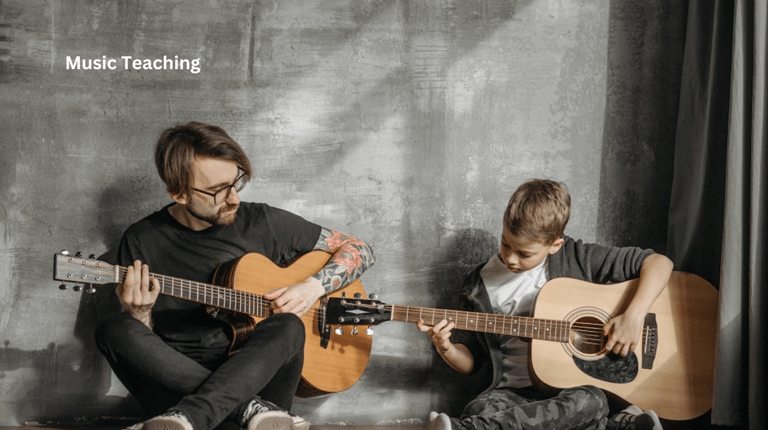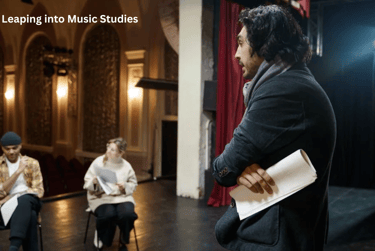The Impact of Music Education on Cognitive Development
1/15/20254 min read


Effects of Music Teaching on Cognitive Growth Introduction
Instead, brain stimulation has an extremely good impact on cognitive development. Studies regularly show that kids who have an ingrained music education improve in memory, attention, and problem-solving skills. This effect runs deep within children and adults.
What Is Cognitive Development?
It leads to improvements in learning as well as the ability to remember, solving abilities in cognitive development where an enhancement is found.
• Central Characteristics of Cognitive Development:
• Retrieval and caching
• Fixation and arousal
• Thought and abstracts
These three are of utmost importance in the academic context in terms of performance, social settings and psychology aspect also, through which Extraordinary music education provides them with some space
When we listen to music, all these brain parts light up.
Neural Pathways During Music
• The auditory cortex receives the Sound Input.
• The action taken when some instrument is being played relates to movement or the action, which pertains to the motor cortex.
• The one that makes decisions and solves problems: the prefrontal cortex. The more pathways music travels within the neural pathway, brain plasticity is encouraged to grow a brain.
Key Cognitive Skills Gained by Music Education
Problem-solving and Critical Thinking
A musician would always analyze their performance, determine where they must improve, and find a creative solution to the workarounds on the problems that may be brought to them.
Music Education and Academic Performance
Music education students perform much better than the rest of the students.
• Much better exam results: The students who are going through music education are performing really well in mathematics and language-based tests.
• Supports Reading Comprehension Skills: Music education promotes phonological awareness, enhancing the reading skills that children develop.
Many studies prove that studying music is proportional to better academic scores; therefore, it needs to be pursued at school-going age.
Learn Music as Early as Possible
Learning musical skills can be very well enhanced if the child learns them
•Language Development: An ability to acknowledge and reproduce some sounds makes better speech and words.
•Development of Creativity: In addition, such early exposure has the potential for creativity by facilitating a child's self-expression through music.
Both Kodály and Suzuki music developmental programs utilize the music skills of their founders to enhance early mental development during critical growing periods.
Role End For Emotional and Social Skills Development
Long Term Impact: impacts on the functions due to learning of music prevail even in the most minute musical learning experience
Music teaching remaps the brain. It also helps it be strong and tough to face all stress factors.
Case Study and Outcomes of Research
1. Harvard Children with music training scored higher in verbal memory, as well as spatial reasoning, too.
2. Toronto Research: The students who get their music training outscored other non-music students and their academics.
3. Neuroscience Findings: Scanning the human brain in different ways reveals that musicians have more corpus callosum, which helps with proper lateralization of the brain.
Music and Brain Development Across Life
Music learning is not limited to children but can make any learner grow up or very old.
• For Children: It develops key thinking abilities along with gross and fine motricity also
• To Teenagers: Abstract thinking pluses emotional control in the learner also
•For Adults: The brain gets sharp, and its degenerative process slows, too.
Cobstacles Facing Successful Implementation of Music Studies
Music studies have not been exempted because even though they contribute, it hasn't been because:
Financing: Virtually nothing can be left because most school budget cuts go for the jugular of lateralization of this school's music programs;
Access: Private instruction/coaching-tutoring runs a pretty penny, and to say it's unaffordable to keep a good instrument is an understatement.
Communal mobilization and resourcefulness will also come in as this same barometer.
Leaping into Music Studies down the Technology Lane
Technology has already rewritten the geography of music in general.
•E-resources: Apps such as Yousician and Simply Piano are there.
•Digital Resources: YouTube has free versions of tutorials with multiple instruments.
These help in democratization; thus, music education accrues the benefits of cognitive functions in other parts of the world.
How Parents and Teachers can facilitate
1. This is one that provokes the child with simple daily activities like singing songs, rhythm clapping, and others.
2. It helps in locality-based community programs of music education to the school-going smobilization.It gives them a friendly environment where they can go on practicing even without worrying about practice.
Conclusion
Not alone in the boon bestowed upon it, music education continues to be an active facilitator of cognitive development. Be it through its influence on memory and, thereby, attention, making one develop that sense of emotional intelligence or influence on some democratization act; such is its utility. For example, schools offering good music education or programs will develop fine qualities of life and talent.
FREQUENTLY ASKED QUESTIONS
1. What are the objectives of learning to play music as a memory development tool?
Boosting of memory: It develops short and long-term memory for some parts in the head through the acquisition of music playing.
2. Does learning help old adults?
Yes! Cognitive flexibility, shrewdly minded, emotionally sound ageing adult.
3. Does formal education depend on outcome?
Formal training impacts the outcome; informal observation of music practice also impacts cognition.
4. What is the age to start learning music for a child?
The best time is when they are young, in early childhood, when their brains are extremely receptive to new learning.
5. What instrument would a child learn first? Which one will help more in cognitive development?
Any instrument is better than nothing. In particular, however, the piano and the string are most favoured as the first instrument.







